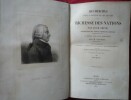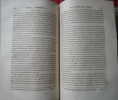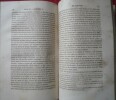Adam SMITH
Recherches sur la nature et les causes de la richesse des nations
traduction du Comte Germain Garnier entièrement revue et corrigée et précédé d'une notice biographique par M. BLANQUI avec les commentaires de Buchanan, G. Garnier, Mac Culloch, Malthus, J. Mill, Ricardo, Sismondi, augmentée de notes inédites de J.B. Say et d'éclaircissementshistoriques par M. Blanqui. éditions Guillaumin à Paris - 1843 - 2 volumes de format : 16,5 x24,5 cm, reliure demi-basane violet de l'époque, dos lisses, plats et gardes marbrés; tome 1 : 79 pages de préface par GARNIER puis 520 pages portrait de A. Smith en frontispice tome 2 : 716 pages rousseurs sinon bon état
Reference : 242
envoi en colissimo offert pour la France métropolitaine
Bookseller's contact details
Librairie Gilles Hamm
M. Gilles Hamm
6, place des pêcheurs
58400 La Charité sur Loire
France
03 86 70 01 86
Payment mode
Sale conditions
Tous les livres d'une valeur supérieure à 100 euros sont envoyés gracieusement en France métropolitaine en service colissimo MES PRIX SONT FIXES ET NON NÉGOCIABLES (je ne répond pas aux demandes de rabais) PAIEMENT UNIQUEMENT PAR CHÈQUE OU VIREMENT ÉLECTRONIQUE . PAS DE CARTE BANCAIRE - pour les achats d'un montant supérieur à 500 euros payés par chèque les livres pourront n'être expédiés qu'après encaissement du chèque (environ 15jours)
5 book(s) with the same title
Recherches sur la nature et les causes de la richesse des Nations.
A Neuchatel, 1792. Cinq tomes reliés en trois volumes in-12. 406, 400, 437, 432 .Premier tome : faux-titre, titre, table, adresse, avertissement, 384 pages . Puis 406 pp., 400 pp., 437 pp., 432 pp. Chaque tome ayant un titre et une table. Traduction de l'anglois par M. Roucher. Bon état intérieur . Demi-percaline vert foncé chagrinée du XIXème, dos lisse orné de sept larges filets or en creux. En bon état.
Précieuse édition de la deuxième traduction française (après celle de Blavet) du célèbre ouvrage classique publié par Smith en 1776, l'un des jalons de la pensée économique moderne. Le traducteur M. Roucher (1743-1794) était un érudit très estimé Edition neuchâteloise établie sur celle parue à Paris chez Buisson en 1790-1791. Adam Smith, philosophe écossais et écrivain célèbre, fondateur du système d'économie politique généralement admis aujourd'hui. Selon Adam Smith, l'Economie politique, considérée comme une branche des connaissances du législateur et de l'homme d'Etat, se propose deux objets distincts : le premier, de procurer au peuple un revenu ou une substance abondante, ou, pour mieux dire, de le mettre en état de se procurer lui-même ce revenu et cette subsistance abondante ; le second, de fournir à l'Etat ou à la communauté un revenu suffisant pour le service public : elle se propose d'enrichir à la fois le peuple et le souverain. En écrivant ses Recherches sur la nature et les causes de la richesse des nations (1776), Adam Smith ne se doutait pas que son ouvrage serait de ceux qui, en décrivant le monde, contribuent à le créer. Comprenant la nation concept éminemment politique comme espace de marché, c'est-à-dire comme surface d'échange, Adam Smith est le théoricien d'une modernité qui, deux siècles après, est toujours la nôtre.
Recherches Sur La Nature et Les Causes De La Richesse Des nations. Traduit De L'anglais De M. Smith
Chez Poinçot 9,5 x 17 A Londres et Se Trouve à Paris, Chez Poinçot 1786 Six volumes in-12, reliure plein veau raciné de l'époque, dos lisse orné de quatre fleurs/grenades encadrées de palmettes et de filets dorés, pièces de titre de maroquin rouge, et de tomaison de maroquin vert, titre et tomaison dorés, tranches rouges, filets dorés sur les coupes, gardes à la coquille, [4]-VIII-298, [4]-266, [4]-292, [4]-239, [4]-310, [4]-368 pp. Le célèbre traité d'Adam Smith (1723-1790) avait paru en Angleterre en 1776. Notre exemplaire en est l'édition pirate, qui est la remise en vente, sous couvert d'une édition londonienne, de l'édition suisse d'Yverdon de 1781 en 6 volumes in-12. Cette dernière était la première traduction française de "La richesse des nations" publiée initialement, en feuilleton et sans nom de traducteur, dans le "Journal de l'agriculture, des arts et du commerce et des finances", en 1779 et 1780. Le traducteur en était en fait l'abbé Jean-Louis Blavet, qui était en relations avec Adam Smith pour avoir traduit sa "Théorie des sentiments moraux" (1774), par l'intermédiaire du salon anglophile de la marquise de Bouffers, maîtresse du prince de Conti, dont Blavet était le bibliothécaire. Le libraire Poinçot était établi à Versailles. Selon Robert Darnton (Editer et pirater, Gallimard, 2021), il était " coriace" en affaires et semblait jouer un rôle de "mouchard", tout en ayant des relations commerciales suivies avec la Société typographique de Neuchâtel (S.T.N.), dont l'habitude était de pirater les éditions françaises. (cf. Darnton, p. 442, note 22). Contrefaçon peu fréquente, notre exemplaire participe pleinement à l'histoire de la diffusion en France de "La richesse des nations" au XVIIIe siècle.. Agréable reliure, petit manque au bas du plat supérieur du tome 3, quelques très légères épidermures, partie inférieure de la page de titre du tome 6 absente, galerie de vers en queue du tome 4. Très bon exemplaire. (Bbis6)PHOTOS NUMERIQUES DISPONIBLES PAR EMAIL SUR SIMPLE DEMANDE-DIGITAL PHOTOGRAPS MAY BE AVAILABLE ON REQUEST.
Recherches sur la Nature et les Causes de la Richesse des Nations.Traduction du Comte Germain Garnier entirement revue et corrigée et précédée d'une Notice Biographique par M. Blanqui. Avec les Commentaires de Buchanan, G. Garnier, Mac Culloch, Malt...
Paris, Guillaumin, 1843. Royal8vo. Bound in 2 contemp. hcalf, spines gilt, tome-and titlelabels with gilt lettering. One tome-label scratched. Stamps on titlepages. Engraved portrait as frontispiece. LXXIX,520"(4),714,(2) pp. Some leaves with light browning, some scattered brownspots.
Third translation into French of Smith's ""An Inquiry into the Nature and Causes of the Wealth of Nations"". ""A third and better translation by Count Germain appeared at Paris An. X (1802) in 5 volumes 8vo, with a portrait of Aam Smith. Other editions were issued in 1809 and 1822, the former in 3 the latter in 6 volumes 8vo, one being a volume of notes. This edition was revised by Jerome Adolphe Blaqui, and was republished in Paris in 1843 in 2 volumes 8vo (the offered item) as volume 5 and 6 of Guillaume's ""Collection des Économistes"".(David Murray in: Adam Smith across Nations. Edited by Cheng-chung Lai)
Recherches sur la Nature et les Causes de la Richesse des Nations. Traduit de l'Anglois de M. Smith [by Blavet]. 2 Tomes.
Londres, Pierre J. Duplain, 1788. 8vo, Two nice uniform contemporary full calf bindings with gilt spines. Some loss of leather to back hinge and lower capital of volume one and minor loos of leather to spine of volume two, all due to worming. Worming is not bad and does not affect anything but outer layer of small parts of the bindings. Apart from the worming a very nice, fresh and clean copy indeed. (8), IV, 503" (4), 496 pp. With both half-titles, the advertisment, both prefaces and the table of contents.
Rare early French translation of Adam Smith's political and economic classic, the ""Wealth of Nations"". Translated by Blavet. The present edition constitutes the third reprint of the second French translation. The second French translation was done by Blavet and is the first translation into French of which the translator and publisher are known. ""The reprint of Blavet's version appeared at Yverdon in 1781 in 6 volumes 12mo, and at Paris in the same year in 3 volumes 12mo, and again at London and Paris in 1788 in 2 volumes 8vo [the present edition], and revised and corrected, with Blavet's name as translator, at Paris An, ix (1800-01) in 4 volumes 8vo.He [Blavet] had no intention of publishing it until his friend M. Ameilhon happened to complain of scarcity of interesting articles for his Journal de l'Agriculture, du Commerce, des Arts et des Finances, which had just come under the control of the Mercantilist. It struck him that he might offer it to him which he did, with the explanation that it was far from perfect. It was accepted, and appeared in the issues of the Journal between January, 1779, and December 1780. He did not anticipate that it would go further. The edition of 1788 likewise appeared without his knowledge or consent, and was still more marred by errors than that of Yverdon"". (Lai, Cheng-chung. Adam Smith Across Nations: Translations and Receptions of The Wealth of Nations, Clarendon Press, UK, 2000). Hailed as the ""first and greatest classic of modern thought"" (PMM 221), Adam Smith's tremendously influential main work has had a profound impact on thought and politics, and is considered the main foundation of the era of liberal free trade that dominated the nineteenth century. Adam Smith (1723-1790) is considered the founder of Political Economy in Britain, mainly due to his groundbreaking work, the ""Wealth of Nations"" from 1776. The work took him 12 years to write and was probably in contemplation 12 years before that. It was originally published in two volumes in 4to, and was published later the same year in Dublin in three volumes in 8vo. The book sold well, and the first edition, the number of which is unknown, sold out within six months, which came as a surprise to the publisher, and probably also to Smith himself, partly because the work ""requires much thought and reflection (qualities that do not abound among modern readers) to peruse to any purpose."" (Letter from David Hume, In: Rae, Life of Adam Smith, 1895, p. 286), partly because it was hardly reviewed or noticed by magazines or annuals. In spite of this, it did evoke immense interest in the learned and the political world, and Buckle's words that the work is ""in its ultimate results probably the most important book that has ever been written"", and that it has ""done more towards the happiness of man than has been effected by the united abilities of all the statesmen and legislators of whom history has preserved an authentic account"" (History of Civilisation, 1869, I:214) well describes the opinion of a great part of important thinkers then as well as now. Considering the groundbreaking views presented in ""Wealth of Nations"", it comes as no surprise that the work was considered part of the revolutionary cultural development in France. As Adam Smith's friend, the Marquis of Lansdowne, said after quoting Smith's work: ""With respect to French principles, as they had been denominated, those principles had been exported from us to France, and could not be said to have originated among the population of the latter country."" (Quoted in: Rae, p. 291). The ideas of Adam Smith were often considered so dangerously closely connected with French ideas at the time that the term ""political economy"" almost became synonymous with questions concerning the constitution of governments. ""The French Revolution seems to have checked for a time the growing vogue of Smith's book and the advance of his principles in this country, just as it checked the progress of parliamentary and social reform, because it filled men's mind with a fear of change, with a suspicion of all novelty, with an unreasoning dislike of anything in the nature of general principle."" (Rae, p. 293). There can be no question that this seminal work greatly influenced French opinion at the time.
Recherches sur la nature et les causes de la richesse des nations.. Publié avec introduction, notes, résumés marginaux par Edwin Cannan. Avec un portrait en héliogravure hors texte. Tome premier [seul paru]
Paris, Alfred Costes, 1950 in-8, LI pp., 394 pp., avec un portrait-frontispice, broché, non coupé.
Unique partie publiée de cette édition, qui est en fait intéressante pour ses pièces liminaires, parues en anglais dès 1904 (Preface, introduction, notes, marginal summary to : An Inquiry into the nature and causes of the wealth of nations by Adam Smith). L'économiste britannique Edwin Cannan (1861-1935) était spécialiste de l'histoire de la pensée économique. - - VENTE PAR CORRESPONDANCE UNIQUEMENT
 Write to the booksellers
Write to the booksellers














